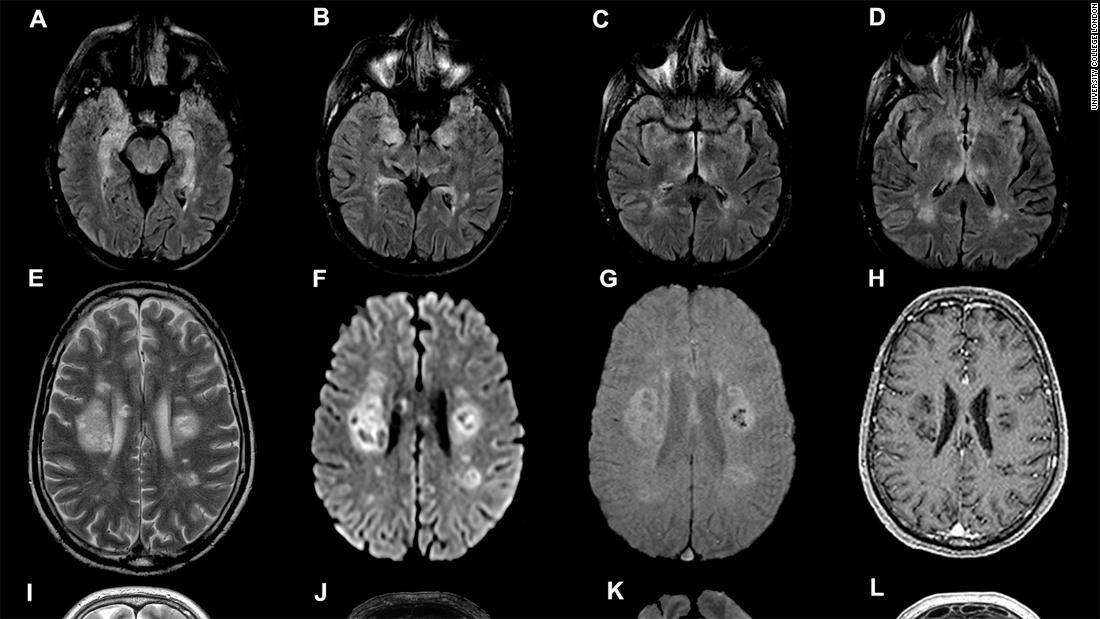Top News
Brain damage can be attributed to Covid-19, scientists warn

Experts at University College London (UCL) are the latest to illustrate that Covid-19 can cause neurological complications including stroke, nerve damage, and potentially fatal inflammation of the brain – even if the patient does not show severe respiratory symptoms associated with this disease. .
Follow-up studies will be needed to understand the potential long-term neurological consequences of a pandemic, they said.
The study, published in the journal Brain, examined 43 patients treated at University College London Hospital for confirmation or suspected coronavirus, from April to May. They vary in ages 16-85, and show a variety of mild to severe symptoms.
Among these patients, researchers found 10 cases of “transient brain dysfunction” and delirium; 12 cases of brain inflammation; eight cases of stroke; and eight cases of nerve damage.
Most patients who show inflammation of the brain are diagnosed with a specific, rare and sometimes deadly condition known as acute disseminated encephalomyelitis (ADEM). Before the pandemic, the research team in London will see about one ADEM patient per month. During the study period, the number rises to at least one week.
A woman hallucinating lions and monkeys in her house. Others report numbness in their limbs or face, double vision, and disorientation. One severe patient is almost unconscious, responding only when in pain.
Researchers are still trying to find out why Covid-19 patients actually experience this brain complication. The virus that causes Covid-19 is not found in their brain fluid, which means the virus does not directly attack the brain. One theory, in contrast, is that complications are indirectly triggered by the immune response of the patient’s body – not from the virus itself.
These findings are important to inform how doctors around the world monitor and treat patients – but they also raise new questions and challenges. For patients who do not show severe respiratory symptoms such as difficulty in breathing, it may be difficult to identify these brain complications early enough to prevent or minimize damage. And for critically ill patients, their precarious health can limit how much doctors can do to investigate what is happening in their brain.
The authors warn that further research will be “important” in finding out how the virus actually causes brain damage, and how to treat it.
“Given that this disease has only been around for a few months, we may not know what long-term damage Covid-19 can cause,” the co-author and Dr. Ross Paterson in a press release. “Doctors need to be aware of possible neurological effects, because early diagnosis can improve patient outcomes.”
David Strain of the University of Exeter Medical School, which is not part of the study, said the findings were important but “not surprising” given the previous coronavirus cases.
“The main limitation is that we don’t know what the denominator is so we don’t know how often these complications occur,” he said in a statement on Wednesday. “We have seen that some people with Covid-19 may need a long rehabilitation period – both physical rehabilitation such as sports, and brain rehabilitation. We need to understand more about the effects of this infection on the brain.”

General internet buff. Hardcore music maven. Typical foodaholic. Friendly student.
Top News
Portuguese historical films will premiere on 29 December.

Method Media Bermuda will present the documentary FABRIC: Portuguese History in Bermuda on Thursday, December 29 at the Underwater Research Institute of Bermuda.
A spokesperson said: “Method Media is proud to bring Bermuda Fabric: Portugal History to Bermuda for its 5th and 6th showing at the Bermuda Underwater Observatory. In November and December 2019, Cloth: A Portuguese Story in Bermuda had four sold-out screenings. Now that Bermuda has reopened after the pandemic, it’s time to bring the film back for at least two screenings.
“There are tickets Ptix.bm For $ 20 – sessions at 15:30 and 18:00. Both screenings will be followed by a short Q&A session.
Director and producer Milton Raboso says, “FABRIC is a definitive account of the Portuguese community in Bermuda and its 151 years of history, but it also places Bermuda, Acors and Portugal in the world history and the events that have fueled those 151 years.
“It took more than 10 years to implement FABRIC. The film was supported by the Minister of Culture, the Government of the Azores and private donors.
“Bermuda Media Method [MMB] Created in 2011 by producer Milton Raposo. MMB has created content for a wide range of clients: Bermuda’s new hospital renovation, reinsurance, travel campaigns, international sports and more. MMB pays special attention to artistic, cultural and historical content.
More about
Model: Everybody, Entertainment, Movies/Movies, History, News

Proud web evangelist. Travel ninja. Creator. Freelance food nerd. Passionate bacon fanatic.
Top News
CRISTANO RONALDO CAN MAKE UP A GIANT IN CARIOCA AND PORTUGUESE TECHNICIAN SAYS ‘There will be room’

News
This is a fact or event of journalistic interest. This may be new or recent information. This also applies to the novelty of an already known situation.
Article
Mostly original text. Expresses the opinion of the author, but not necessarily the opinion of the newspaper. It can be written by journalists or specialists from different fields.
Investigative
A report that contains unknown facts or episodes with a pronounced denunciatory content. This requires special methods and resources.
Content commerce
Editorial content that offers the reader conditions for making purchases.
Analysis
This is the interpretation of the news, taking into account information that goes beyond the facts told. It uses data, brings events and scenario forecasts, as well as past contexts.
Editorial
Analytical text translating the official position of the vehicle in relation to the facts covered.
Sponsored
This is an institutional article on a topic of interest to the company sponsoring the report.
fact checking
Content that confirms the accuracy and authenticity of the disclosed information or facts.
Context
This is an article that brings subsidies, historical data and relevant information to help understand a fact or news.
special
An exciting report that details the various aspects and developments of this topic. It brings data, statistics, historical context, as well as stories of characters that are affected by or directly related to the topic in question.
Interview
A subject-specific approach in which the subject is presented in a question and answer format. Another way to publish interviews is through threads, where the interviewee’s answer is reproduced in quotation marks.
Criticism
A text with detailed analysis and opinions on products, services and works of art in a wide variety of fields such as literature, music, film and visual arts.

Proud web evangelist. Travel ninja. Creator. Freelance food nerd. Passionate bacon fanatic.
Top News
Maestro de Braga is the first Portuguese in the National Symphony Orchestra of Cuba.

Maestro Filipe Cunha, Artistic Director of the Philharmonic Orchestra of Braga, has been invited to conduct the Cuban National Symphony Orchestra, as announced today.
According to a statement sent by O MINHO, “he will be the first Portuguese conductor to conduct this orchestra in its entire history.”
In addition to this orchestra, the maestro will also work with the Lyceo Mozarteum de la Habana Symphony Orchestra.
The concerts will take place on 4 and 12 March 2023 at the National Theater of Cuba in Havana.
In the words of the maestro, quoted in the statement, “these will be very beautiful concerts with difficult but very complex pieces” and therefore he feels “very motivated”.
From the very beginning, Rachmaninoff’s Piano Concerto No. 2 will be performed by an Italian pianist (Luigi Borzillo), whom the maestro wants to bring to Portugal later this year. In the same concert, Mendelshon’s First Symphony will be performed.
Then, at the second concert, in the company of the Mexican clarinetist Angel Zedillo, he will perform the Louis Sfora Concerto No. 2. In this concert, the maestro also conducts Tchaikovsky’s Fifth Symphony.
“This is an international recognition of my work. An invitation that I accept with humility and great responsibility. I was surprised to learn that I would be the first Portuguese member of the Cuban National Symphony Orchestra. This is a very great honor,” the maestro said in a statement.
“I take with me the name of the city of Braga and Portugal with all the responsibility that goes with it, and I hope to do a good job there, leaving a good image and putting on great concerts. These will be very special concerts because, in addition to performing pieces that I love, especially Rachmaninov and Tchaikovsky, I will be directing two wonderful soloists who are also my friends. It will be very beautiful,” concludes Filipe Cunha.

Proud web evangelist. Travel ninja. Creator. Freelance food nerd. Passionate bacon fanatic.
-
World3 years ago
The Gabby Petito case. Brian Landry set up camp with his family after his girlfriend disappeared
-
Top News4 years ago
Tristan Thompson reacts to Khloé Kardashian’s new appearance
-
Top News4 years ago
TLC ‘sMothered’ recap: ‘Party curled up,’ boyfriend problem
-
Top News4 years ago
Alex Cooper hosts a solo podcast
-
Top News4 years ago
2021 Ford Bronco price: Here’s how much the 2-door and 4-door cost
-
Tech4 years ago
Fall Guys is supplying out a legendary costume and Kudos as an apology present
-
Top News4 years ago
Chiara de Blasio was ‘very cold’ during the arrest of the protest: witness
-
Top News4 years ago
How to Watch Yellowstone Season 3, Episode 2 Live Online










